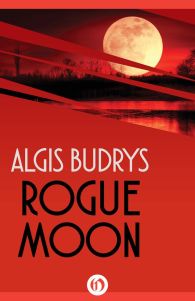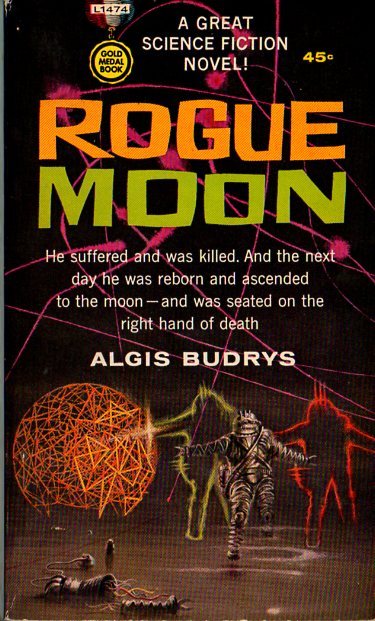Tags
1960, 1960s, Algis Budrys, Gold Medal, Gollancz SF Masterworks, Hugo Award nominee, Open Road Media, psychological, Richard Powers
Hidden on the surface of the moon is a labyrinthine alien relic, something that Dr. Edward Hawks of Continental Electronics has spent years investigating. The Navy wanted Continental’s matter-transmitter for its obvious potential, but when the artifact was discovered, they saw an immediate application for the transmitter: the Navy uses it to send investigators to the moon’s surface, explorers who search the artifact for signs of its purpose or creators. But every investigator who enters the artifact eventually dies, and after enough deaths, goes insane. You see, the matter-transmitter doesn’t physically transmit a worker to the Moon, it instead transmits a perfect copy—a duplicate, piloted by the original back in the lab. It creates the troubling situation where the original copy continues working on in the lab, going home each night to see his family, while the other copy becomes a charred smear inside an alien puzzle-box. The original suffers extreme mental trauma from the strangeness of the artifact and from undergoing their twin copies’ deaths, and many would-be investigators go from “right stuff” hotshots into broken husks with damaged minds.
Hawks is running out of volunteers, and the Navy is growing reluctant to fund the project, having sent several men into the labyrinth, with progress inching along death by death. But the Director of Personnel, Connington, thinks that a new type of man is needed. In fact, he’s already found the perfect man for the job: Hemingwayesque ur-man Al Barker, a thrill seeker who’s spent his life flirting with death. A former OSS commando, race-car driver, mountain climber, parachutist, and all-around daredevil, he’s lost a leg already in his pursuit of manly excursions. And it seems Connington is after Barker’s wife, Claire, a seductress who manipulates men… men like Barker, as she needles him into taking the assignment so he doesn’t look like “less of a man” in front of her. Barker begins to make progress through the artifact, but will he complete a path through this nightmarish funhouse before he becomes its newest broken victim?
Those expecting a rousing adventure of humans challenging adversity—manifest destiny on the moon—will be in for a rude awakening. Same for anyone expecting a focus on the hard science, or even on the Big Dumb Object. More time is spent with the philosophizing Hawks than on the Moon; the alien artifact remains a mysterious symbol until the last chapter of the novel, at which point the themes begin to coalesce. Rogue Moon instead uses the alien artifact and matter transmitters as metaphors to examine life and death. The matter transmitter in particular opens up the tenuous middle ground of human duplication, probing its morality as well as the psychological toll on the original copy as he experiences his copy’s death. The artifact is an unknowable enigma—something truly alien, similar to later enigmas in Roadside Picnic or Solaris. This is the stuff existential nightmares are made of, and Budrys handles it to the best of his ability.
These characters grapple with themes of identity, each one having a name evocative of their personalities as if they’re wearing their identities on their sleeves. Hawks looks over his project like a bird of prey, manipulating men to work in the project’s best interests, sending others to die for a mere yard of progress while he sits back and takes notes. Barker is loud and brutish, a bull in a china shop ever-eager to prove himself a member of Hemingway’s code of model manliness. Connington is conniving and shady, setting Barker on this dangerous assignment to get Claire all to himself—and Claire is a right peach, manipulative, seductive, using her sexuality to toy with men for her own amusement. I would criticize the novel for some of its very dated gender politics, except I’m not sure how much of it was intentional—Barker’s ur-male persona, fretting over perceptions of inadequate manliness, obviously was.
 Rogue Moon is both a brilliant meditation on life and death and a philosophical horror story, showing how a subtle and thoughtful application of science fiction can lead to a rather superb novel. It’s a book full of symbolism and metaphor that focuses on psychological and philosophical elements over character depth and narrative action… but it succeeds very well at what Budrys intended it to do. A dark and thought-provoking novel, Rogue Moon is the kind of SF novel I love to read—where I’m still pondering the novel’s implications days later. I highly recommend it to anyone who intrigued by this kind of lunar exploration, plumbing the dark depths of the human mind.
Rogue Moon is both a brilliant meditation on life and death and a philosophical horror story, showing how a subtle and thoughtful application of science fiction can lead to a rather superb novel. It’s a book full of symbolism and metaphor that focuses on psychological and philosophical elements over character depth and narrative action… but it succeeds very well at what Budrys intended it to do. A dark and thought-provoking novel, Rogue Moon is the kind of SF novel I love to read—where I’m still pondering the novel’s implications days later. I highly recommend it to anyone who intrigued by this kind of lunar exploration, plumbing the dark depths of the human mind.
Book Details
Title: Rogue Moon
Editor: Algis Budrys
First Published Date: 1960
What I Read: ebook (Open Road Media, 2016)
Price I Paid: $0 (e-ARC via NetGalley)
MSRP: $8? pb / $7.99 ebook
ISBN/ASIN: 978-0575108004 / B019ESGO3A


Sounds like it has miles more depth/complexity than Michaelmas… or The Falling Torch — both very average novels… Your review almost compels me to return to Budrys — but I’ve been so disappointed with his work!
LikeLiked by 1 person
Reading this, I thought it would be of interest to you… certainly not as deep as Malzberg or Disch, but thought-provoking in its own way. I usually don’t like novels with thin characterization, but here it felt like their wafer-thin depth helped play into some of the deeper themes.
LikeLike
I think I found it quite a good novel when I read a few years ago,but got lost in the plot,and couldn’t figure out what was going on.I’ve virtually forgotten what it was about.The “thin characterization” you mention,was the trouble I think.
LikeLiked by 1 person
The plot is deep and vague, and with some of Hawks’ philosophical musings I can easily see how you were lost by this novel. Still rather enjoyed it, some of the concepts Budrys raises are fascinating…
LikeLike
I think it would have occured to you as it has to me,that the basic premise of trying to enter a mysterious ediface that’s inpenetrable and unknowable,has marked shades of Franz Kafka’s “The Castle”.Assuming he very well might have been trying to transform the Czech author’s novel within an SF premise,I think he might have found himself out of his depth in trying to emulate the greater writer by trying to create an existential work.
I’d say it was very probably exponential at the time,but was soon to be superceeded by much better books that dealt with similar themes.It was unfortunately flawed in actual execution.
LikeLike
Really enjoyed this review Chris as I’ve been meaning to get this one for yonks – yes, that time is now upon me!
LikeLiked by 1 person
I’m (slowly) trying to read more award winners… this one at least I agree was worthy 🙂
LikeLiked by 1 person
Very interesting. It’s on the list for me to read eventually, and I’ve been wondering about it. I’ve never read Budrys, other than excerpts of his criticism that I’ve seen around, which seems hit and miss. But wasn’t he the first critic on-the-record to suspect that Shadow of the Torturer was more than meets the eye? I find that very interesting about him.
From the things you say about Rogue Moon, it kind of sounds like what Pohl was doing with Man Plus, with all the commentary about masculinity and gender expectations. I like stuff like that, but this is 15 years older than MP, so that’s pretty impressive, too. I may have to sneak this one in sooner.
LikeLiked by 1 person
I’d be very interested in your take, especially after it started dealing with gender-based themes. There’s a notable theme of gender as power: Barker feels powerful by becoming the living embodiment of martial manliness, and Clare feels powerful because she can manipulate this ur-man. She does stuff like leave his fake leg just out of reach so he has to struggle for it when getting out of the pool; I get the feeling that’s why he’s with her, because she gives him more obstacles to overcome.
Though in hindsight it spends a lot more time—and is more conclusive—in examining the whole duplication thing: are the copies still you? Are you the sum of your memories? Anyways, you’ll have to read it eventually, like when you get to the Hugo ‘1s.
This was my first Budrys novel, and yeah, I’ve also seen a lot of mixed reviews. A lot of his criticism and book reviews are fascinating, even ones I don’t agree with… and yes, I believe you are right about his commenting on Wolfe.
LikeLiked by 1 person
Great review as always Admiral, I love the Powers cover too. I have a completely different version of this novel featuring a wraparound by Chris Yates. All the best.
LikeLiked by 1 person
Pingback: Rogue Moon; or, Adventures in Reader Reactions | MarzAat
Pingback: 2016 In Review | Battered, Tattered, Yellowed, & Creased